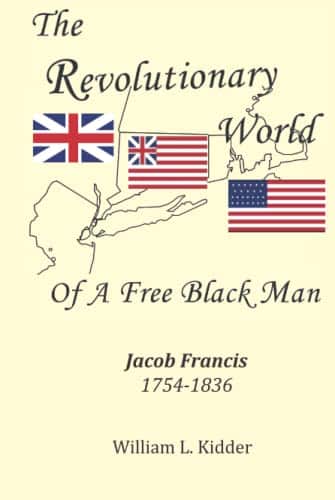With this renewed commitment to ending racism, the timing feels right to expand the scope of Black History Month. Traditionally, we’ve celebrated the men and women who altered our trajectory in the face of rampant racism: Harriet Tubman, Dr. Martin Luther King Jr., Rosa Parks, and Barack Obama, among a handful of others. But what about the countless others who never came close to ascending to such heights but contributed to our collective wellbeing?
On February 13, local historian and author William L. Kidder will highlight one such figure during a free lecture at Washington Crossing Historic Park. (At the time of this writing, the lecture was scheduled to be in person. It may be moved online, depending on the local COVID transmission rate around the time of the lecture. Either way, you can register here.)
Kidder’s lecture will be based on his latest book, The Revolutionary World of a Free Black Man: Jacob Francis 1754-1836, which was published in December.

He first encountered Jacob Francis’s name 12 years ago while he was working on a book about a regiment of the Hunterdon County Militia. He’d discovered his veterans pension application, which was unusually detailed. That was out of necessity. Because of the prejudice of the time, Black soldiers were required to go to greater lengths to prove who they were and where they fought.
Kidder homed in on Francis as the subject of his own book in part because he participated in the crossing on Christmas night 1776. For all historians like Kidder have been able to uncover about that critical night, there are likely volumes of information that remain unknown because recordkeeping at the time was spotty at best. For instance, of the 2,400 soldiers who crossed the Delaware, it’s hard to say with any certainty how many of them were Black.
Francis was likely in the minority. He was there with the 16th Continental Regiment, which originated in Massachusetts. He enlisted in Salem, MA, in October 1775.
“It was on the day that George Washington issued orders not to enlist any Black men, so there was some question as to whether he even could enlist or be allowed to serve,” Kidder says.
Francis was not from Massachusetts. He was born to a free Black woman in Amwell Township, New Jersey, on January 15, 1754. At a young age, his mother put him into indentured servitude with a local white farmer. Unlike an enslaved person, who had no rights or any expectation of being released, an indentured servant was owned for a predetermined period. Francis’s expired on his 21st birthday.
“Jacob’s very clear in saying his time was owned, but not his person,” Kidder says.
He was owned by five different men, the last of which was located in Salem. Purely through the course of the war, Francis came to arrive 15 miles from where he was born. Prior to then, he hadn’t been in New Jersey for years. Not knowing if his mother was still alive or even what his real last name was, he went in search of her when his enlistment ended after the Battle of Trenton.
“He found his mother – I don’t think she lived much longer – and learned his surname, which he used for the rest of his life,” Kidder says. “He became a farmer and did the impossible: He owned land, which was not supposed to happen by law.”
Francis also fought with the Hunterdon County Militia for the remaining six years of the war.



